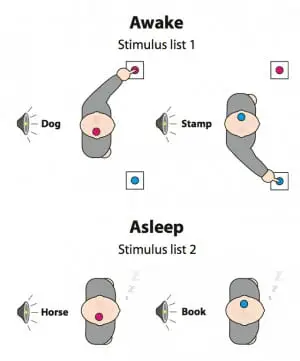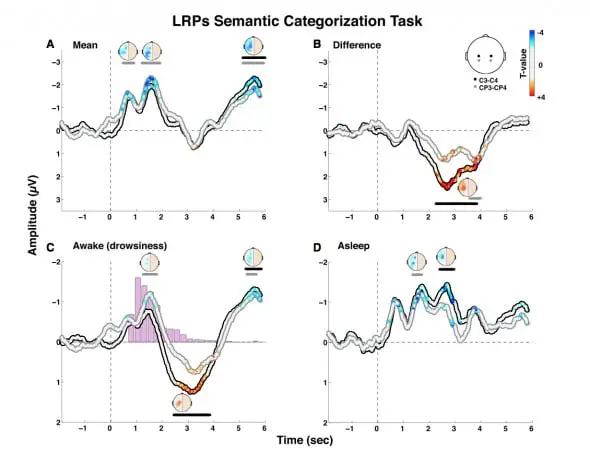The quest to beat sleep is, in my opinion one of the noblest human endeavors of all. Assuming we could do so without at all moroning our ability to learn or function happily, the addition of as much as an extra third of a day, across the board, would do more to help researchers cure diseases than any charitable donation. Yet, if we can’t end sleep, perhaps we could at least make it a bit more useful to our everyday lives?
It’s hard not to imagine such an end-game when reading about a fascinating new paper proving sensible (or “task-relevant”) neural responses in the sleeping brain. They think we can do basic processing and, perhaps, even math in our sleep; how many Bitcoin hash files do you think you could break over 40 solid winks?
 The study itself was remarkably simple. Participants were fitted with electrodes that read brain activity, then asked a series of categorization questions. In one experiment they were asked to categorize words as either animals or objects, in another as either words or pseudo words, but in both cases they made their choice by pressing a button with either the left or right hand. This physical intention, to move either the left or right hand, is easily distinguishable in brain scans. More importantly, something called the lateralized readiness potential lets them see this left-right intention even if the user never actually moves either hand at all.
The study itself was remarkably simple. Participants were fitted with electrodes that read brain activity, then asked a series of categorization questions. In one experiment they were asked to categorize words as either animals or objects, in another as either words or pseudo words, but in both cases they made their choice by pressing a button with either the left or right hand. This physical intention, to move either the left or right hand, is easily distinguishable in brain scans. More importantly, something called the lateralized readiness potential lets them see this left-right intention even if the user never actually moves either hand at all.
Next they let the participants drop into pre-REM sleep and began anew with an all new list of words. When reading a word like “horse,” a participant would reliably (and while sleeping soundly) show a lateralized response potential — but not necessarily in the right direction. Accuracy fell dramatically when asleep (understandable) but having been exposed to the list before falling asleep change those results. This study proves that some amount of awareness persists while we sleep, and that it can access ancient brain processes like speech processing. Having gotten used to the process of creating a lateralized response potential, the brain responds as it should to incoming stimuli — it just doesn’t do so with much intelligence attached.
Does this vindicate all those people playing motivation tapes while they sleep? Probably not. The team found that the brain is unequivocally hearing the words, even understanding them in a very crude sort of way, but it seems to be a sort of automatic type analysis rather than real abstract reasoning. As such, we might be able to do basic (very basic) mathematical reasoning while asleep, going left for true and right for false. A sleeping brain doesn’t have much power, but it might be able to handle “1 + 1 = 3.”

It’s been known for a while that the sleeping brain is not totally oblivious to the outside world; one ingenious study showed that the sleeping brain can form and remember associations between smells and stimuli, and that people maintain those associations both when asleep and awake. This is really more interesting than it is useful; even if we could accurately falsify one equation per second over an eight hour sleep period, we still couldn’t do nearly as much work as a smartphone in an instant. As such, we probably won’t be running any SETI crowd-sourcing brainware to go with the software of old.
This study shows just how little of the brain might actually be shut off during dreaming, as we essentially dope ourselves with a self-made hallucinogenic and chemically tie ourselves to the bed while we trip. These researchers estimate that in some cases the entire input-to-concept-to-action pathway could be intact save the very final ability to put intention into motion.
A more nuanced understanding of just how our brains continue to function at night could allow us to do some actual manipulation of our minds while we sleep. It probably won’t come in the form of an inspiring pep-talk, but perhaps the right sequence of simple conceptual prodding could lead us down helpful paths of thought. The science of sleep is still in its infancy but, as with so much research these days, it’s advancing at a lightning pace.
 |
 Ape Out Shirt $21.68 |
 |
